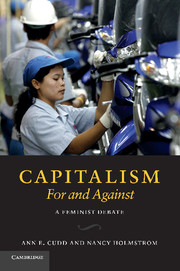4 - Nancy Holmstrom's reply to Ann Cudd
Published online by Cambridge University Press: 05 June 2012
Summary
Introduction: ideal versus nonideal theorizing
There is much that professor cudd and I agree on in this debate regarding feminism and capitalism. Most basically, of course, since we are both feminists, we believe that women are oppressed and that this is morally wrong. In words at least, we share the same goal of social freedom (though both her goal and its relationship to capitalism are ambiguous). We also agree that capitalism creates conditions that make the liberation of women possible and we would support many of the same reforms to capitalism. Furthermore, we agree that the bureaucratic model of the former Soviet Union is not a desirable alternative to capitalism. Beyond that, however, we part company. The burden of my argument has been that while, on the one hand, capitalism creates the potential for genuine human liberation, at the same time it puts systematic barriers to its realization. This is especially true for women as they tend to be among the least powerful in all societies. The source of improvements under capitalism is development, which is not unique to capitalism; hence, advances achieved since capitalism began are not a definitive argument in favor of it today. Moreover, as I have tried to show, while capitalism was a progressive force in human history, it is so no longer. Indeed, it threatens the future of humankind.
- Type
- Chapter
- Information
- Capitalism, For and AgainstA Feminist Debate, pp. 289 - 322Publisher: Cambridge University PressPrint publication year: 2011



